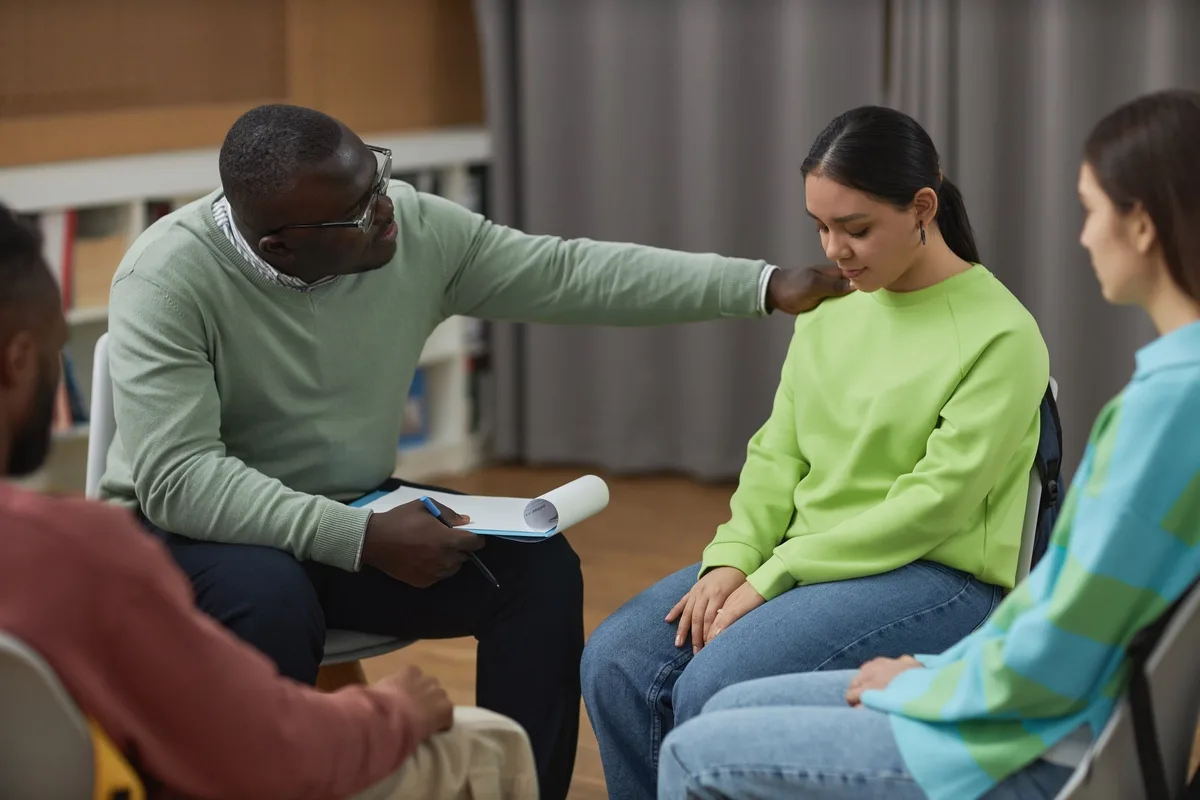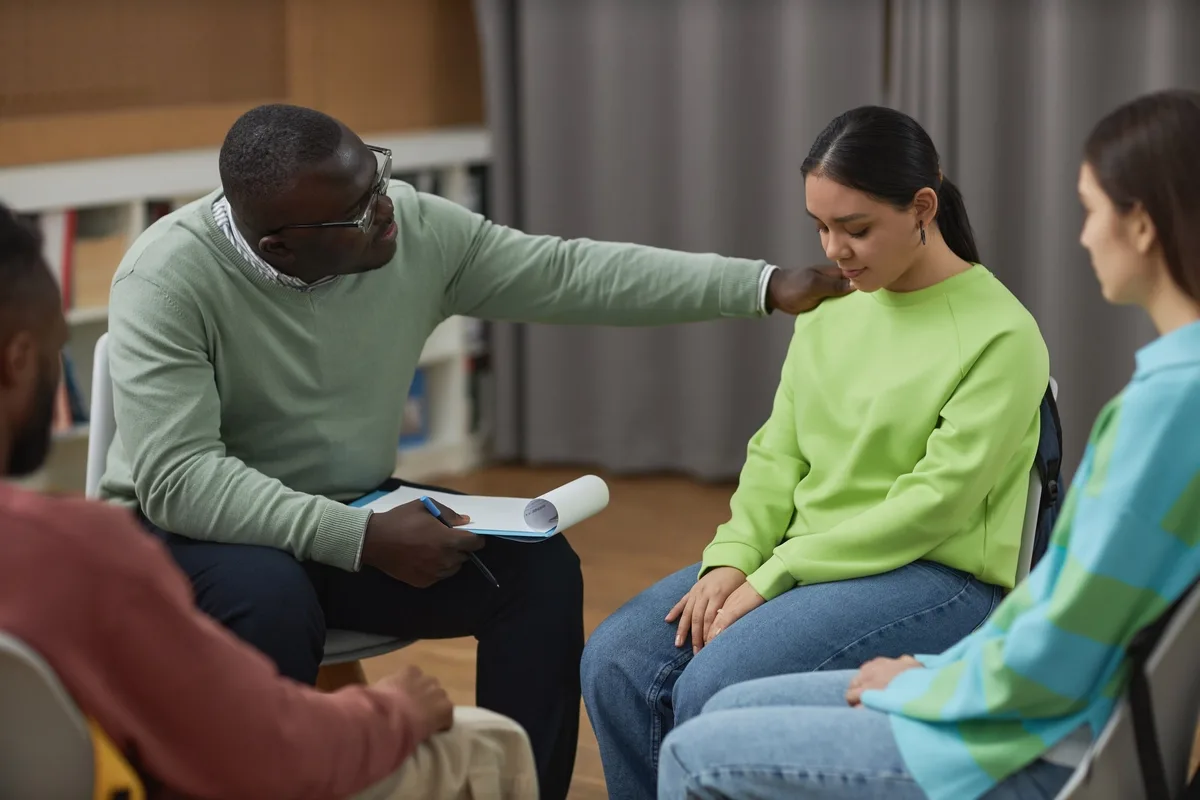24/7 Helpline:
(866) 899-221924/7 Helpline:
(866) 899-2219
Learn more about Prescription drug Rehab centers in Orange County

Other Insurance Options

Kaiser Permanente

CareFirst

Amerigroup

Covered California

Health Choice

GEHA

Meritain

Health Partners

Self-pay options

Medical Mutual of Ohio

Group Health Incorporated

Multiplan

Absolute Total Care
Beacon

Lucent

Cigna

Sutter

UMR

Optum

Excellus

California Prime Recovery
California Prime Recovery is a drug and alcohol rehab for adults with substance use disorders, situa...

Oceanfront Recovery
Oceanfront Recovery is a premier rehabilitation center for men and women struggling with substance a...

Monarch Shores
In beautiful Capistrano Beach, California, Monarch Shores is an alcohol and drug rehab center that p...

Miramar Recovery Center – Newport Beach Rehab
Miramar Recovery Center – Newport Beach Rehab is a private rehab located in Newport Beach, Californi...

Woodglen Recovery Junction
Woodglen Recovery Junction is a detox clinic located in Fullerton, CA. Woodglen Recovery Junction sp...

Lighthouse Treatment Center
Lighthouse Treatment Center is a drug and alcohol rehab that supports adults struggling with addicti...

Monte Nido
Monte Nido is an eating disorder center at Newport Beach that serves as a stand-alone facility for m...

Action Consultants Therapy
Action Consultants Therapy is a private rehab located in Costa Mesa, California. Action Consultants ...

Windward Way Recovery
Windward Way Recovery is a private drug and alcohol rehabilitation facility in Newport Beach, Califo...

Coastal Care Substance Abuse Institute
Coastal Care Substance Abuse Institute offers outpatient detox services for individuals with a Subst...

New Directions for Women
New Directions for Women (NDFW) is a drug and alcohol treatment provider offering addiction detox an...

Spencer Recovery Centers
Spencer Recovery Centers offers inpatient and outpatient services for individuals with mental health...

Miramar Recovery Center – Laguna Beach
Miramar Recovery Center – Laguna Beach is a private rehab located in Laguna Beach, California. Miram...

Associates in Counseling – Laguna Hills
Associates in Counseling – Laguna Hills is a private rehab located in Laguna Hills, California. Asso...

Serenity New Life
Serenity New Life is a private rehab located in Orange, California. Serenity New Life specializes in...

Beachside Recovery
Beachside Recovery is a private rehab located in Newport Beach, California. Beachside Recovery speci...

Hope House
Hope House provides comprehensive addiction treatment in a supportive environment for adults in Anah...

Child Guidance Center
Child Guidance Center is a private rehab located in Buena Park, California. Child Guidance Center sp...

Pat Moore Foundation
Pat Moore Foundation is a private rehab located in Costa Mesa, California. Pat Moore Foundation spec...

Pacific Hills – Women’s Residential
Pacific Hills – Women’s Residential is a private rehab located in Capistrano Beach, California. Paci...

Encompass Adolescent Treatment Program
Encompass Adolescent Treatment Program is located in San Juan Capistrano, CA. Encompass Adolescent T...

Phoenix House – Wraparound Services in Orange County
Phoenix House–Wraparound Services in Orange County is a 12 step focused drug and alcohol rehab for a...

Recovery Solutions of Santa Ana
The Santa Ana Comprehensive Treatment Center (CTC) stands as a dedicated substance abuse rehab cente...

Ocean Recovery – 1115 West Balboa Blvd.
Ocean Recovery is a drug and alcohol treatment center that supports women struggling with addiction....

New Behaviors Outpatient
New Behaviors Outpatient is a private rehab located in Santa Ana, California. New Behaviors Outpatie...

Clear Treatment – Orange County Detox
Clear Treatment – Orange County Detox is a private rehab located in Costa Mesa, California. Clear Tr...

Hired Power
Hired Power is an outpatient rehab located in Huntington Beach, CA. Hired Power specializes in the t...

Nsight Psychology & Addiction
The Nsight Psychology & Addiction Partial Hospitalization (PHP) and Intensive Outpatient Treatment P...

Chapters Capistrano
Chapters Capistrano philosophy is to provide the most comfortable and therapeutic program to assist ...

Cornerstone of Southern California
Cornerstone of Southern California provides outpatient and inpatient programs for individuals with s...

Woodglen Recovery Junction – Orangethorpe Avenue
Woodglen Recovery Junction - Orangethorpe Avenue offers inpatient treatment for individuals dealing ...

Harmony Heals Holistic Counseling Center
Harmony Heals Holistic Counseling Center is a private rehab located in Laguna Hills, CA. Harmony Hea...

Anaheim Lighthouse
Anaheim Lighthouse is a CARF accredited detox and substance abuse treatment center in Anaheim, CA. O...

Royale Therapeutic Residential Center
Royale Therapeutic Residential Center is a private rehab located in Santa Ana, California. Royale Th...

Children and Youth Services
Children and Youth Services is a public rehab located in Dana Point, California. Children and Youth ...

CASA Recovery – Del Obispo Street
CASA Recovery - Del Obispo Street offers alcohol and substance abuse treatment and also co-occurring...

California Hispanic Commission – Casa Elena
California Hispanic Commission - Casa Elena offers inpatient treatment for individuals with alcohol ...

Pro – Found Private Treatment
Pro – Found Private Treatment is a private rehab located in Newport Beach, California. Pro – Found P...

Twin Town Treatment Centers
Twin Town Treatment Centers, in Orange, California, is a 12 step-focused drug and alcohol rehab for ...

CA Diversion Intervention Foundation
CA Diversion Intervention Foundation is a private rehab located in Orange, California. CA Diversion ...

New Life Spirit Recovery
New Life Spirit Recovery is a private rehab located in Huntington Beach, California. New Life Spirit...

The Landing
The Landing is a luxury, 12 step-focused drug and alcohol rehab for adult men in Newport Beach, Cali...

Solutions 4 Recovery
Solutions for Recovery offers inpatient treatment for individuals with alcohol and/or substance addi...

Center for Adolescent Addiction Recovery – The CAAR
Center for Adolescent Addiction Recovery – The CAAR is a non-profit rehab located in Anaheim, Califo...

New Beginning Fellowship Center
New Beginning Fellowship Center is a non-profit rehab located in Fountain Valley, CA. New Beginning ...

Pacific Palms Recovery
Pacific Palms Recovery - Camino Mira Costa offers outpatient and intensive outpatient treatment for ...

Choices Recovery Services
Choices Recovery Services is a private rehab located in Santa Ana, California. Choices Recovery Serv...

Wel Mor Psychology Group
Wel-Mor Psychology Group provides outpatient and intensive outpatient services to help individuals t...

Cornerstone of Southern California – Outpatient Program
Cornerstone of Southern California – Outpatient Program is a private rehab located in Santa Ana, Cal...

K C Services – Garden Grove Blvd
K.C. Services is dedicated to provide comprehensive substance abuse and family violence services to ...

Tree House Recovery
Tree House Recovery is a substance use disorder treatment center for men, located in Costa Mesa, Cal...

StepHouse Recovery
StepHouse Recovery provides substance abuse treatment by offering a whole continuum of care includin...

Alternative Sentencing Program
Alternative Sentencing Program is a private rehab located in Newport Beach, California. Alternative ...

KC Services
KC Services is a mental health and substance use disorder rehab located in Fullerton, CA. The facili...

Chapman Medical Center – Behavioral Health
Chapman Medical Center – Behavioral Health is a private rehab located in Orange, California. Chapman...

Ocean Recovery – West Balboa Boulevard
Ocean Recovery - West Balboa Boulevard offers inpatient treatment for women with alcohol and/or subs...

Cooper Fellowship
Cooper Fellowship is a private rehab located in Santa Ana, California. Cooper Fellowship specializes...

Sober Partners Network
Sober Partners Network provides drug and alcohol treatment, interventions, sober companions and coac...

Chapman House
The Chapman House stands as an accredited substance abuse rehab center in Orange, CA for men and wom...

Wel Mor Psychology Group
Wel-Mor Psychology Group provides outpatient and intensive outpatient services to help individuals t...

Hoag Addiction Treatment Centers
Hoag Addiction Treatment Centers provides superior alcohol and drug detox and rehab programs with a ...

Covenant Hills
Covenant Hills Treatment Center - Paseo Adelanto offers inpatient and outpatient services for indivi...

Ther Residential Center
Ther Residential Center is a private rehab located in Anaheim, California. Ther Residential Center s...

Teen Challenge – Timothy House
Teen Challenge - Timothy House is faith-based home for teen boys and an adolescent recovery ministry...

Hotel California by the Sea
Hotel California by the Sea, in Newport Beach, California, is a luxury drug and alcohol rehab for ad...

Straight Talk – Gerry House
Located in Santa Ana, California, Straight Talk- Gerry House is an alcohol and drug rehab facility t...

Footprints Behavioral Health
Footprints Behavioral Health - Calle Bienvenido offers inpatient and outpatient services for individ...

Wavelengths Recovery
Wavelengths Recovery is a drug and alcohol rehab that supports adults and adolescents in the Hunting...

Simple Recovery
Simple Recovery offers outpatient services for individuals with alcohol and/or substance addiction. ...

New Start Recovery
New Start Recovery is a drug and alcohol rehab located in Santa Ana, California. They provide multi-...

Akua Mind & Body
AKUA Mind & Body is a clinically based treatment center in California directed towards the managemen...

Cornerstone of Southern California
Cornerstone of Southern California - 427 S. Yorba Street offers transitional house services for indi...

Get Real Recovery
Get Real Recovery provide substance abuse and dual diagnosis holistic treatment programs for those i...

Balboa Horizons Treatment Services
Balboa Horizons Treatment Services offers outpatient and inpatient services for individuals with men...

TruVida Recovery – Via Valverde Home
TruVida Recovery offers inpatient services for individuals with alcohol and/or substance addiction. ...

Monarch Shores
Monarch Shores offers treatment for individuals with alcohol and/or substance addiction. The program...

Beachside Recovery
Beachside Recovery offers inpatient and outpatient services for individuals with alcohol and/or subs...

Sheer Recovery
Sheer Recovery offers inpatient and outpatient services for individuals with alcohol and/or substanc...

Orange County Health & Psychology Associates – OCHPA
Orange County Health & Psychology Associates (OCHPA) is a mood, eating disorders and dual diagnosis/...

Pure Life Recovery Services
Pure Life Recovery Services offers inpatient and outpatient treatment for individuals with alcohol a...

Surf City Recovery
Surf City Recovery is a drug and alcohol rehab located in Huntington Beach, California. They provide...

449 Recovery
449 Recovery stands as a CARF-accredited substance abuse treatment rehab in Mission Viejo, Californi...

Satori Recovery Center
Satori Recovery Center is an addiction detox facility that emphasizes Mindfulness, Meditation and cu...

The Well Recovery Center
The Well Recovery Center - Lake Street is a residential treatment center that provides opiate and al...

Coastline – Women’s Program
Coastline–Women’s Program is a luxury, 12 step-focused drug and alcohol rehab for adult women in Hun...

The Well Recovery Center
The Well Recovery Center - Cornell Avenue is a residential treatment center that provides opiate and...

Lomonaco Palms Recovery
Lomonaco Palms Recovery is a private substance abuse treatment dedicated to serve adults male and wo...

Miramar Recovery Center – Costa Mesa
Miramar Recovery Center is a proven substance abuse and dual diagnosis treatment for men and women. ...

Beach City Treatment
Beach City Treatment offers inpatient detox services for individuals with alcohol and/or substance a...

Safe Harbor House
Safe Harbor Treatment Center - Offers detox and inpatient treatment for those dealing with alcohol a...

Canyon View Treatment Centers
Canyon View Treatment Centers, part of Aspire Health Network, offers inpatient and outpatient servic...

Coastline Behavioral Health
Coastline Behavioral Health is a drug and alcohol rehab located in Huntington Beach, California. The...

Orange County Recovery
Orange County Recovery is a substance abuse and mental health facility with over 20 years of experie...

Five Points Men’s Sober Living
The Cottages offers a safe transitional sober living for men who are in their path of sobriety. Atte...

Adelante Recovery
Adelante Recovery is a private rehab located in Corona del Mar, California. Adelante Recovery specia...

Addiction Recovery Center
Addiction Recovery Center offers inpatient and intensive outpatient services for substance abuse and...

True Life Recovery
True Life Recovery provides medical detox for women and 24-hour clinical care. True Life Recovery is...

California Rehab Campus
Dana Point Rehab Campus is a private rehab part of Addiction Recovery Centers located in Dana Point,...

Pacific Sands Recovery Center
Pacific Sands Recovery Center is a drug and alcohol rehab located in Santa Ana, California. They pro...

Casa Capri Recovery
Casa Capri Recovery for women is a passionate group of women who have come together for one purpose...

Clear Life Recovery
Clear Life Recovery provides a full continuum of care from detox through sober living. They offer de...

Creo Spero
Creo Spero is an accredited dual-diagnosis addiction treatment center in Santa Ana, California for m...

Anchored Recovery Community – ARC
Anchored Recovery Community is a private rehab located in San Juan Capistrano, CA. Anchored Recovery...

Acacia Counseling
Acacia Counseling is a private rehab located in Irvine, California. Acacia Counseling specializes in...

Revision Counseling
Revision Counseling is a private rehab located in Anaheim, California. Revision Counseling specializ...

True Recovery
True Recovery has a state-of-the-art center with fully licensed staff. They offer "Real Yoga Classes...

Resurgence Behavioral Health
Resurgence Behavioral Health is an accredited substance abuse rehab center in Costa Mesa, California...

Sirona
Sirona is a private rehab center located in San Juan Capistrano, California. Sirona specializes in t...

OC Revive
OC Revive stands as an accredited drug and alcohol addiction rehab center in Lake Forest, California...

Sierra by the Sea
Sierra by the Sea is a public rehab located in Newport Beach, California. Sierra by the Sea offers p...

Orange County Rescue Mission
Orange County Rescue Mission, in Tustin, California, provides faith-based addiction recovery service...

A Better Life Recovery
A Better Life Recovery is a private rehab center for men located in San Juan Capistrano, California....

Sunshine Behavorial Health
Sunshine Behavorial Health is a private rehab center located in San Juan Capistrano, California. Sun...

The Mental Health Collective
The Mental Health Collective is a private rehab located in Newport Beach, California. The Mental Hea...

Center for Discovery La Habra
Center for Discovery–La Habra provides comprehensive mental health care for children and adolescents...

Discovery Mood & Anxiety Program – Los Alamitos
Discovery Mood & Anxiety Program – Los Alamitos is a private rehab located in Los Alamitos, Californ...

Center for Discovery Los Alamitos
Center for Discovery Los Alamitos is a private rehab located in Los Alamitos, California. Center for...

Orange County Teen Challenge
Orange County Teen Challenge is a private rehab located in Santa Ana, California. Orange County Teen...

Mission Recovery Treatment Center
Mission Recovery Treatment Center is a private rehab located in Laguna Hills, California. Mission Re...

Inspire Health
Inspires clinical approach to treatment is to address our patients’ substance use disorder alongside...

California Behavioral Healthcare
California Behavioral Healthcare is a detox and rehabilitation center for people dealing with alcoho...

Laguna View Detox
Laguna View Detox is a private rehab located in Laguna Beach, California. Laguna View Detox speciali...

Virgil – California
Virgil makes it easier to feel better from anywhere. We offer simple, personalized mental health car...

Life Vessel Treatment Recovery Center
At Life Vessel, our mission is to offer a gateway to a better life for anyone suffering from active ...

Compassion Recovery Centers
Compassion Recovery Centers is a public rehab located in Laguna Hills, California. Compassion Recove...

Alter Behavioral Health
Alter Behavioral Health is a private rehab located in Irvine, California. Alter Behavioral Health sp...

Hilliside Mission
Hilliside Mission is a public rehab located in Mission Viejo, California. Hilliside Mission speciali...

Star Recovery Centers
Star Recovery Center is a gender-specific detox & residential inpatient program in Santa Ana, Califo...

Domus Retreat
Domus Retreat is a private alcohol and opioid treatment program facility located in Anaheim Hills, C...

Dana Point Rehab Campus
Dana Point Rehab Campus is a private rehab located in Dana Point, California. Dana Point Rehab Campu...

Anchored Tides Recovery
Anchored Tides Recovery is a private rehab located in Huntington Beach, California. Anchored Tides R...

Renaissance Recovery
Renaissance Recovery stands as an accredited substance abuse treatment rehab in Fountain Valley, CA....

Pacific Sand and Recovery Center
Pacific Sand and Recovery Center is a private rehab located in Santa Ana, California. Pacific Sand a...

Indah Recovery
Indah Recovery is a private rehab located in Dana Point, California. Indah Recovery specializes in t...

California Care Detox and Treatment
California Care Detox and Treatment is a public rehab located in San Juan Capistrano, California. Ca...

Altignis Health
Altignis Health is a public rehab located in Laguna Beach, California. Altignis Health specializes i...

ITTR Detox
ITTR Detox is a private rehab located in Anaheim, California. ITTR Detox specializes in the treatmen...

First Responder Wellness
First Responder Wellness is a private rehab located in Newport Beach, California. First Responder We...

Praxis 12
Praxis 12 is a private rehab located in San Clemente, California. Praxis 12 specializes in the treat...

Hope By The Sea
Healing over 5,000 individuals and families through proven treatment programming. 20 years of effect...

South Shores Recovery
South Shores Recovery is a private rehab located in San Juan Capistrano, California. South Shores Re...

Hillside Mission Recovery
Hillside Mission Recovery is a private rehab located in Mission Viejo, California. Hillside Mission ...

California Treatment Services DBA Recovery Solutions of Santa Ana
California Treatment Services DBA Recovery Solutions of Santa Ana is a private rehab located in Sant...

Pillars Recovery
Pillars Recovery is a residential addiction treatment facility in Orange County, CA. We help men and...

Recovery Beach
Recovery Beach is a drug and alcohol rehab located in Garden Grove, California. They provide inpatie...

PACE Recovery Center – 16th Street
PACE Recovery Center - 16th Street offers intensive outpatient and transitional living programs for ...

Orange County Recovery Services
Orange County Recovery Services offers intensive outpatient and outpatient treatment for individuals...

Soul Sanctuary
Soul Sanctuary is an accredited adult residential addiction treatment facility dedicated to providin...

New Existence Recovery
New Existence Recovery is a state-of-the-art substance abuse recovery facility in Costa Mesa, Califo...

Path to Serenity
Path to Serenity is a private rehab located in Villa Park, California. Path to Serenity specializes ...

South Coast Behavioral Health
South Coast Behavioral Health, in Costa Mesa, California, is a luxury drug and alcohol rehab for adu...

Southern California Recovery Center – SCRC
Southern California Addiction Recovery Center, located in Dana Point, California, is a premier outpa...

South Orange County Detox and Treatment
South Orange County Detox and Treatment is a private rehab located in San Clemente, California. Sout...

Keystone Sober Living – Keystone I
Keystone Sober Living - Keystone 1 is a substance abuse sober living facility in Costa Mesa, Califor...

South Coast Counseling
South Coast Counseling is a nonprofit drug and alcohol rehabilitation facility in Costa Mesa, Califo...

Clean Path Behavioral Health
Clean Path Behavioral Health is a private substance abuse center in Costa Mesa, California. They pro...

Breakaway Health Corporation – Breakaway
BreakAway Health Corporation is a private substance abuse and mental health treatment facility in Co...

SoberTec
SoberTec is located in San Clemente, California. SoberTec provides a secure and comfortable environm...

Yellowstone Recovery
Yellowstone Recovery is a nonprofit drug and alcohol addiction recovery center in Costa Mesa, Califo...

The Chadwick House
The Chadwick House is a private substance abuse recovery house in Huntington Beach, California, a sh...

Center for Change
Center for Change is a private rehab located in Westminster, Colorado. Center for Change specializes...

Community Reach Center
Community Reach Center is a private rehab located in Westminster, Colorado. Community Reach Center s...

Devereux Advanced Behavioral Health – Cleo Wallace
Devereux Advanced Behavioral Health - Cleo Wallace has a wide range of Community Based Services whic...

Mosaic Community Services
Mosaic Community Services provides mental health and substance abuse assessments, individual and gro...

New Life for Girls
New Life for Girls is an inpatient faith-based program for women located in Westminster, MD. New Lif...

Recovery Center
Recovery Center is a private rehab located in Westminster, Maryland. Recovery Center specializes in ...

Mountain Manor Outpatient Services – Carroll Plaza
Mountain Manor Outpatient Services - Carroll Plaza is located in Westminster, Maryland. Mountain Man...

Villa Maria of Carroll County BHS
Villa Maria of Carroll County BHS is a private rehab located in Westminster, Maryland. Villa Maria o...

BH Health Services
BH Health Services is a private rehab located in Westminster, Maryland. BH Health Services specializ...

Weber Sober Homes – Stonewall House
Weber Sober Homes - Stonewall House offers a halfway house for those men in recovery from drugs and ...

Addiction Healing Center at the Westminster Rescue Mission
At Westminster Rescue Mission, they believe that everyone is capable of recovery and that this is pr...

Carroll County Youth Service
Carroll County Youth Service is a private rehab located in Westminster, Maryland. Carroll County You...

Recovery Centers of America at Westminster
Recovery Centers of America’s main concern is patient safety, whether from their addiction, or COVID...

CHD Outpatient Behavioral Health Services
CHD Outpatient Behavioral Health Services is a private rehab located in Orange, Massachusetts. CHD O...

ServiceNet – Orange Recovery Home
ServiceNet - Orange Recovery Home is a recovery house that offers help for adult men in the early st...

Weber Sober Homes – Joey V House
Weber Sober Homes- Joey V House, located in Westminster, Maryland, offers a halfway house for men in...

Family Connections
Family Connections is a private rehab located in Orange, New Jersey. Family Connections specializes ...

PaRC Cypress Intensive Outpatient Program
PaRC Cypress Intensive Outpatient Program is a 12-step-focused drug and alcohol rehab for adolescent...

Santa Maria Hostel
Santa Maria Hostel is a private rehab located in Cypress, Texas. Santa Maria Hostel specializes in t...

Psychology Associates – Orange
Psychology Associates – Orange is a private rehab located in Orange, Virginia. Psychology Associates...

Crescent Moon Recovery
Crescent Moon Recovery is a private rehab located in Huntington Beach, California. Crescent Moon Rec...

Healing Path Recovery
Healing Path Recovery is a drug and alcohol treatment center in Newport Beach, California that helps...

Saint Josephs Hospital – Behavioral Health Services
Saint Josephs Hospital – Behavioral Health Services is a private rehab located in Orange, California...

Alternative Options Counseling Center
Alternative Options Counseling Center is a private counseling clinic located in Placentia, CA. Alter...

Get Real Recovery
Get Real Recovery is an outpatient treatment that serves individuals who are struggling with substan...

Sober Techniques
Sober Techniques is a private rehab located in San Clemente, California. Sober Techniques specialize...

The Rose
The Rose provides residential treatment for individuals with alcohol and/or substance addiction. The...

Western Youth Services – Mission Viejo
Western Youth Services (WYS)--Mission Viejo provides outpatient mental and behavioral health care fo...

National Treatment Centers
National Treatment Centers is a private rehab located in Newport Beach, California. National Treatme...

Harbor Wood Services – ACM Recovery
Harbor Wood Services – ACM Recovery is a private rehab located in Orange, California. Harbor Wood Se...

Phoenix Rising Behavioral Healthcare
Phoenix Rising Behavioral Healthcare is a private rehab located in Ladera Ranch, California. Phoenix...

Pacific Hills – Men’s Residential
Pacific Hills – Men’s Residential is a private rehab located in San Clemente, California. Pacific Hi...

Intervention Resource Group
Intervention Resource Group is a private rehab located in San Juan Capistrano, California. Intervent...

Seaview Drug Rehab Centers of Newport Beach
Seaview Drug Rehab Centers of Newport Beach is a private rehab located in Newport Beach, California....

Hopecube
Hopecube is a private rehab located in Orange, California. Hopecube specializes in the treatment of ...

Center for Treatment of Addiction
Center for Treatment of Addiction is a private rehab located in Fullerton, California. Center for Tr...

Alta Institute Chemical Dependency Intervention Prog
Alta Institute Chemical Dependency Intervention Prog is a private rehab located in Fullerton, Califo...

New Method Wellness – Rancho Viejo Road
New Method Wellness - Rancho Viejo Road offers inpatient and outpatient services for individuals wit...

Seacliff Recovery Center – 7th Street
Seacliff Recovery Center - 7th Street offers outpatient and sober living house services for individu...

Anaheim Alana Club
Anaheim Alana Club is a non-profit rehab located in Anaheim, California. Anaheim Alana Club speciali...

HERO House
HERO House is a private rehab located in Costa Mesa, California. HERO House specializes in the treat...

Twin Town Treatment Centers
Twin Town Treatment Centers is a private rehab located in Mission Viejo, California. Twin Town Treat...

The Hope Institute
The Hope Institute is a private rehab located in Costa Mesa, California. The Hope Institute speciali...

Southern California Alcohol
Southern California Alcohol is a private rehab located in Anaheim, California. Southern California A...

Sunshine Sobriety
Sunshine Sobriety is a private rehab located in La Habra, California. Sunshine Sobriety specializes ...

Grupo Nueva Luz
Grupo Nueva Luz is a private rehab located in Santa Ana, California. Grupo Nueva Luz specializes in ...

Solutions 4 Recovery
Solutions 4 Recovery is a private rehab located in Dana Point, CA. Solutions 4 Recovery specializes ...

AA – Alcoholics Anonymous – East Santa Ana Boulevard
Alcoholics Anonymous (AA) - East Santa Ana Boulevard is a fellowship of men and women who have had a...

AA – Alcoholics Anonymous
AA – Alcoholics Anonymous is a non-profit rehab located in Buena Park, California. AA – Alcoholics A...
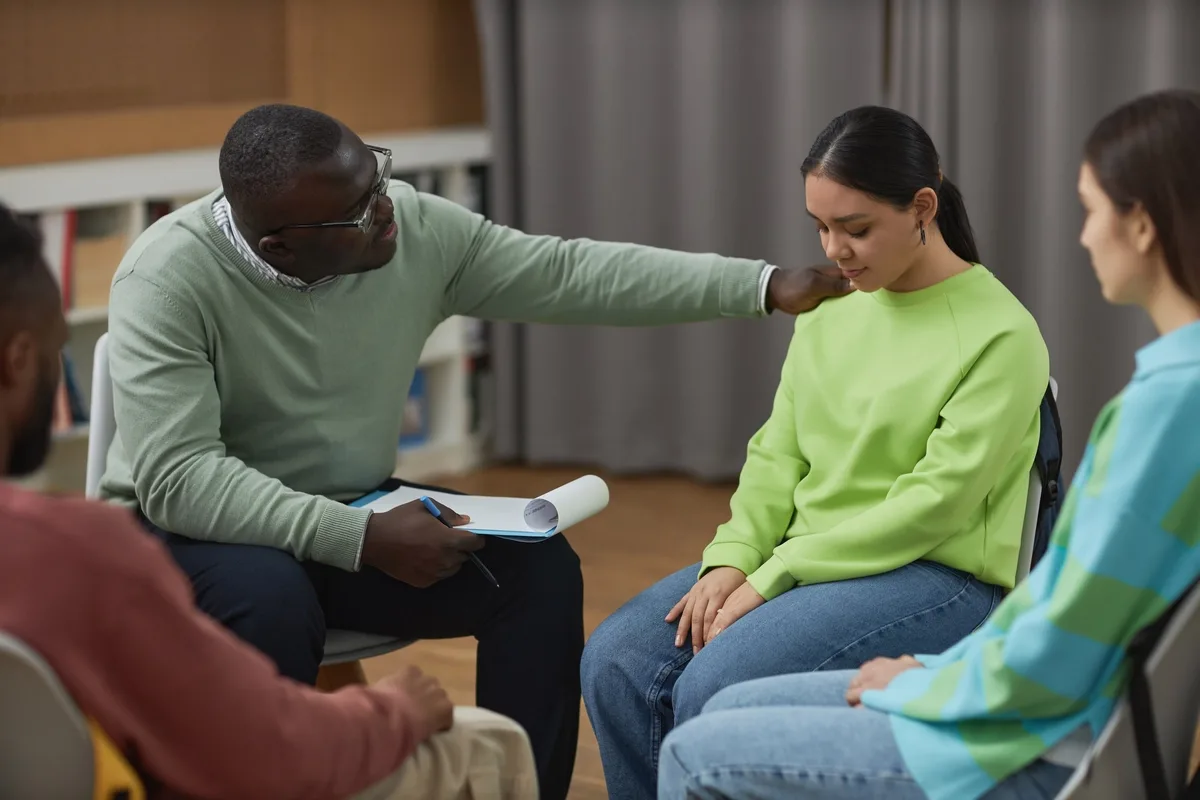
Pat Moore Foundation – Women’s Facility
Pat Moore Foundation – Women’s Facility is a private rehab located in Santa Ana, California. Pat Moo...

Phoenix House – Behavioral Health Intervention and Support Services (BHIS)
Phoenix House – Behavioral Health Intervention and Support Services (BHIS) is a private rehab locate...

AMFM Mental Health and Addiction Treatment Center – Camino De Los Mares
AMFM Mental Health and Addiction Treatment Center - Camino De Los Mares offers inpatient and outpati...

Sure Haven Recovery
Sure Haven Recovery is a private rehab located in Costa Mesa, California. Sure Haven Recovery specia...

Pace Recovery Center
Pace Recovery Center is a private rehab located in Huntington Beach, California. Pace Recovery Cente...

Southern CA Alcohol and Drug Program – Outpatient
Southern CA Alcohol and Drug Program – Outpatient is a private rehab located in Huntington Beach, Ca...

Bridge Teen Recovery
Bridge Teen Recovery is a private rehab located in Laguna Hills, California. Bridge Teen Recovery sp...

Team Intervention
Team Intervention is a private rehab located in Huntington Beach, California. Team Intervention spec...

Center for Treatment of Addiction
Center for Treatment of Addiction is a private rehab located in Huntington Beach, California. Center...

Reflections Recovery Center
Reflections Recovery Center is a private rehab located in Fountain Valley, California. Reflections R...

Covenant Hills – Women’s Transitional
Covenant Hills - Women's Transitional is a sober living house dedicated to serve women in recovery f...

Asian Alcohol and Drug Abuse Counseling
Asian Alcohol and Drug Abuse Counseling is a private rehab located in Santa Ana, California. Asian A...

Addiction Alternatives
Addiction Alternatives is a private rehab located in Santa Ana, California. Addiction Alternatives s...

Changes for Recovery
Changes for Recovery is a private rehab located in Santa Ana, California. Changes for Recovery speci...

Laguna Beach Sober Living
Laguna Beach Sober Living offers inpatient treatment for individuals recovering from alcohol and/or ...

Serenity Shores Recovery Center
Serenity Shores Recovery Center is a private rehab located in Costa Mesa, California. Serenity Shore...

Turning Pages Recovery
Turning Pages Recovery is a private rehab located in Huntington Beach, California. Turning Pages Rec...

Southwest Addiction Medicine
Southwest Addiction Medicine is a private rehab located in Laguna Beach, California. Southwest Addic...

Pacific Recovery
Pacific Recovery is a private rehab located in Capistrano Beach, California. Pacific Recovery specia...
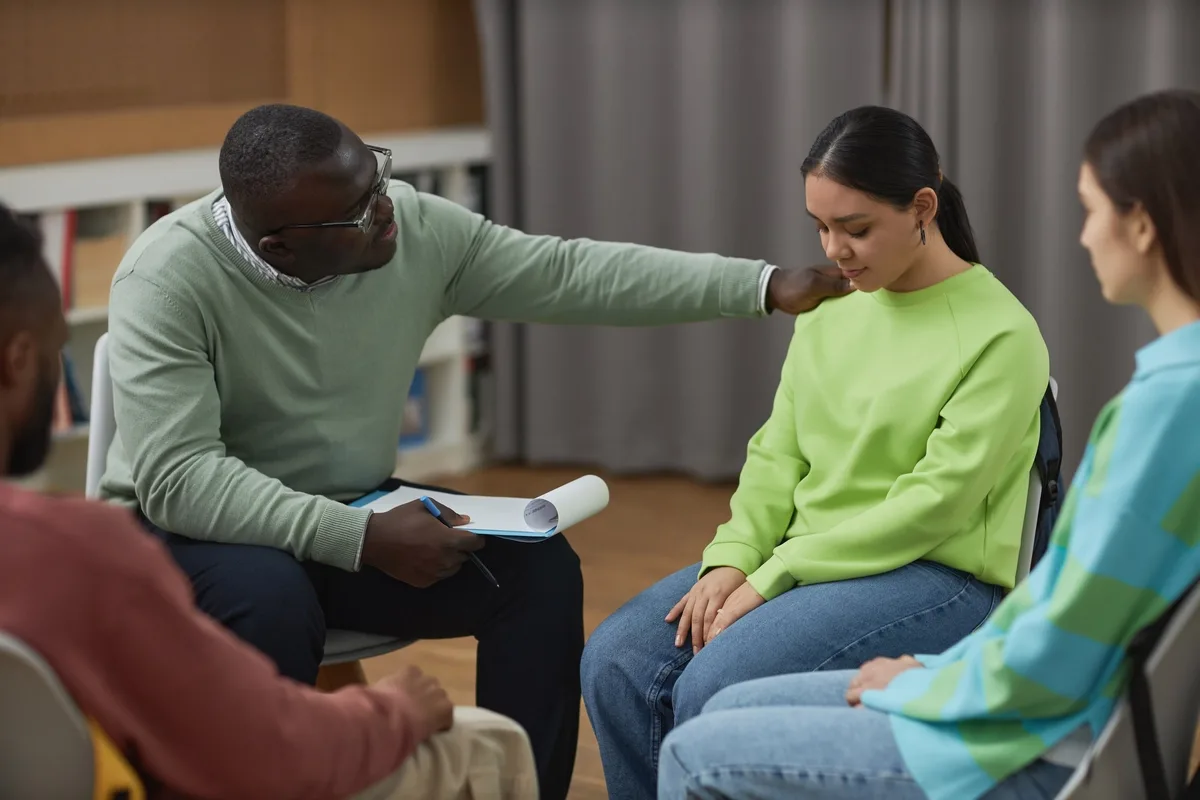
Annie Lugo Rehabilitation Services
Annie Lugo Rehabilitation Services is a private rehab located in Santa Ana, California. Annie Lugo R...

California Council on Problem Gambling and Addiction
California Council on Problem Gambling and Addiction is a private rehab located in Anaheim, Californ...

Gloriosa Treatment Center
Gloriosa Treatment Center is a private rehab located in Mission Viejo, California. Gloriosa Treatmen...

Comeback Treatment Centers
Comeback Treatment Centers is a private rehab located in Anaheim, California. Comeback Treatment Cen...

Anamika Inpatient Alcohol Treatment Center
Anamika Inpatient Alcohol Treatment Center offers inpatient and outpatient treatment for individuals...

Orange Coast Recovery
Orange Coast Recovery is a private rehab located in San Juan Capistrano, California. Orange Coast Re...

Serenity House
Serenity House is a private rehab located in San Juan Capistrano, California. Serenity House special...

Northbound Treatment Services
Northbound Treatment Services is a nationally recognized, private and exclusive drug rehab and alcoh...

California Hispanic Commission – Familia Drug Abuse
California Hispanic Commission – Familia Drug Abuse is a private rehab located in Santa Ana, Califor...

Child Mental Health Service
Child Mental Health Service is a public rehab located in Laguna Beach, California. Child Mental Heal...

Hope By The Sea – Arroyo Road
Hope By The Sea - Arroyo Road offers a wide range of programs for substance abuse and co-occurring d...

Mainstream Group – Mayo House
Mainstream Group – Mayo House is a private rehab located in San Clemente, California. Mainstream Gro...

Wits Inn Recovery
Wits Inn Recovery is an addiction treatment facility offering a multitude of treatment and detox opt...

Straight Talk
Straight Talk offers a wide range of high quality mental health counseling to residents of Orange an...

Newport Coast Recovery
Newport Coast Recovery is a private rehab located in Newport Beach, California. Newport Coast Recove...

SouthCoast Recovery
SouthCoast Recovery is a private rehab located in San Clemente, California. SouthCoast Recovery spec...

Alano Club
Alano Club is a non-profit rehab located in Garden Grove, California. Alano Club specializes in the ...

Addiction Center for Healing
Addiction Center for Healing is a private rehab located in Irvine, California. Addiction Center for ...

Orange County Detox Services
Orange County Detox Services is a private rehab located in Santa Ana, California. Orange County Deto...

KC Services
K.C. Services is dedicated to provide comprehensive substance abuse and family violence services to ...

Dee’s House
Dee's House is a private rehab for women located in Fountain Valley, CA. Dee's House specializes in ...

Comeback Sober Living
Comeback Sober Living is a private rehab located in Anaheim, California. Comeback Sober Living speci...

Jack Grisham’s Center for Change
Jack Grisham’s Center for Change is a private rehab located in Huntington Beach, California. Jack Gr...

Vive La Vida
Vive La Vida is a private rehab located in San Juan Capistrano, California. Vive La Vida specializes...

Pacific Shores Sober Living Homes
Pacific Shores Sober Living Homes offers sober living services for individuals recovering from alcoh...

Coastal Family Therapy Services
Coastal Family Therapy Services is a non-profit rehab located in Newport Beach, California. Coastal ...

SouthCoast Recovery
SouthCoast Recovery is a private rehab located in San Juan Capistrano, California. SouthCoast Recove...

Luminance Recovery
Luminance Recovery offers a full continuum of addiction recovery care, starting with a professionall...

Morningside Recovery
Morningside Recovery offers inpatient and outpatient services for those individuals struggling with ...

Serenity Recovery Center
Serenity Recovery Center is a private rehab located in Tustin, California. Serenity Recovery Center ...

Our House Behavioral Health
Our House Behavioral Health is a sober living facility located in beautiful Orange County, Californi...

Surf City Detox
Surf City Detox is a private rehab located in Huntington Beach, California. Surf City Detox speciali...

Alcohol and Drug Abuse Services
Alcohol and Drug Abuse Services - Santa Ana Clinic offers inpatient treatment for individuals with a...

Que Somos Hoy – Alcoholicos Anonimos
Que Somos Hoy Alcoholicos Anonimos offers outpatient treatment for individuals with alcohol and/or s...

Upfront Recoveries Drug Rehab of Costa Mesa
Upfront Recoveries Drug Rehab of Costa Mesa is a private rehab located in Costa Mesa, California. Up...

Sober Living Huntington Beach
Sober Living Huntington Beach is a private rehab located in Huntington Beach, California. Sober Livi...

Executive Sober Living
Executive Sober Living is a private rehab located in Dana Point, California. Executive Sober Living ...

Orange County Detox Services
Orange County Detox Services is a private rehab located in Huntington Beach, California. Orange Coun...

Milestone Sober Living
Milestone Sober Living is a private rehab located in Dana Point, California. Milestone Sober Living ...
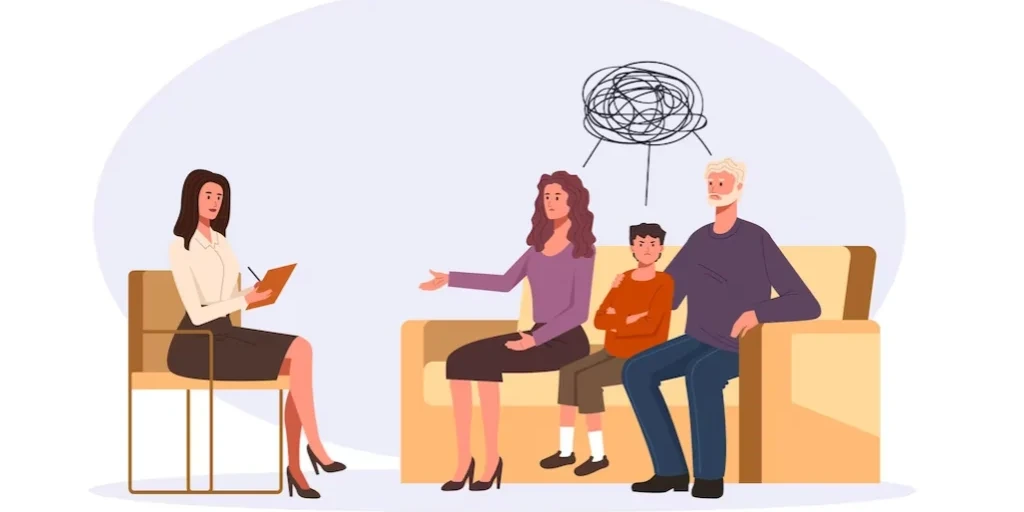
Touchstones
Touchstones offers inpatient and outpatient treatment for individuals with alcohol and/or substance ...

Therapy Residential Center
Therapy Residential Center is a private rehab located in Westminster, California. Therapy Residentia...

Drug Diversion Program
Drug Diversion Program is a private rehab located in Brea, California. Drug Diversion Program specia...

Crossroads Recovery Centers
Crossroads Recovery Centers offers inpatient services for individuals dealing with alcohol and/or su...

C’s Aloha House
C’s Aloha House is a private rehab located in Orange, California. C’s Aloha House specializes in the...

The Tree House
The Tree House is a private rehab located in Costa Mesa, California. The Tree House specializes in t...

Quail Hill Recovery for Women
Quail Hill Recovery for Women is a private rehab located in Irvine, California. Quail Hill Recovery ...

Grupo Esperanza de Vivir – AA – Alcoholicos Anonimos
Grupo Esperanza de Vivir – AA – Alcoholicos Anonimos is a non-profit rehab located in Anaheim, Calif...

Newport Coast Drug Treatment
Newport Coast Drug Treatment is a private rehab located in Newport Coast, CA. Newport Coast Drug Tre...

Woodglen Recovery Junction – East Commonwealth Avenue
Woodglen Recovery Junction - East Commonwealth Avenue offers inpatient treatment for individuals dea...

AA – Alcoholics Anonymous
AA – Alcoholics Anonymous is a non-profit rehab located in Anaheim, California. AA – Alcoholics Anon...

AA – Alcoholics Anonymous – District 20
Alcoholics Anonymous (AA) - District 20 offers outpatient treatment for individuals with alcohol add...

Grupo Nuevo Modena Alcolicos
Grupo Nuevo Modena Alcolicos is a private rehab located in Orange, California. Grupo Nuevo Modena Al...

Sobertec
Sobertec - Columbia offers inpatient and outpatient services for individuals with alcohol and/or sub...

Purdetox
Purdetox is a private rehab located in Laguna Beach, California. Purdetox specializes in the treatme...

Santa Ana Alano Club
Santa Ana Alano Club is a non-profit rehab located in Santa Ana, California. Santa Ana Alano Club sp...

Center for Treatment of Addiction
Center for Treatment of Addiction is a private rehab located in Garden Grove, California. Center for...

Sentencing Concepts Counseling Concepts
Sentencing Concepts Counseling Concepts is a private rehab located in Anaheim, California. Sentencin...

Alcohol and Drug Abuse – Unidos Recovery Home
Alcohol and Drug Abuse – Unidos Recovery Home is a private rehab located in Garden Grove, California...

Beach Landing Drug and Alcohol Recovery for Men
Beach Landing Drug and Alcohol Recovery for Men is a private rehab located in Fountain Valley, CA. B...

449 Recovery
449 Recovery is a private rehab located in San Clemente, California. 449 Recovery specializes in the...

Chapman House
Chapman House is a private rehab located in Newport Beach, California. Chapman House specializes in ...

The Sober Zone Treatment Center
The Sober Zone Treatment Center is a private rehab located in Fullerton, California. The Sober Zone ...

AA – Alcoholics Anonymous – West Valencia Drive
AA – Alcoholics Anonymous – West Valencia Drive is a non-profit rehab located in Fullerton, Californ...

Grupo Fuente de Vida – AA – Alcoholicos Anonimos
Grupo Fuente de Vida – AA – Alcoholicos Anonimos is a non-profit rehab located in Santa Ana, Califor...

New Life Treatment Center
New Life Treatment Center is a private rehab located in Dana Point, California. New Life Treatment C...

Al Anon Family Group
Al Anon Family Group is a non-profit rehab located in Santa Ana, California. Al Anon Family Group sp...

Alta Institute Chemical Dependency Intervention Prog
Alta Institute Chemical Dependency Intervention Prog is a private rehab located in Santa Ana, Califo...

Sober Pacific Living
Sober Pacific Living is a private rehab located in Capistrano Beach, California. Sober Pacific Livin...

Sovereign Health
Sovereign Health provides mental health and substance abuse services for adults and adolescents. The...

Newport Beach Stephouse Recovery
Newport Beach Stephouse Recovery is a private rehab located in Newport Beach, California. Newport Be...

Wel Mor Psychology Group
Wel-Mor Psychology Group provides outpatient and intensive outpatient services to help individuals t...

Mariposa Women and Family Center
Mariposa Women and Family Center is a private rehab located in Orange, California. Mariposa Women an...

Pacific Clinics – Substance Abuse
Pacific Clinics – Substance Abuse is a private rehab located in San Clemente, California. Pacific Cl...

First House Sober Living Homes of Orange County
First House Sober Living Homes of Orange County is a private rehab located in Costa Mesa, California...

Mainstream Group
Mainstream Group is a private rehab located in San Clemente, California. Mainstream Group specialize...

Twin Town Treatment Centers
Twin Town Treatment Centers - Katella Avenue offers outpatient treatment for individuals with alcoho...

Drug Addiction Treatment and Rehabilitation
Drug Addiction Treatment and Rehabilitation is a private rehab located in Garden Grove, California. ...

AA – Alcoholics Anonymous – Grupo Uno MAS
AA – Alcoholics Anonymous – Grupo Uno MAS is a non-profit rehab located in Santa Ana, California. AA...

Recovery Center
Recovery Center is a private rehab located in Costa Mesa, California. Recovery Center specializes in...

New Start Detox
New Start Detox offers inpatient treatment for individuals dealing with alcohol and/or substance add...

AA – Alcoholics Anonymous
AA – Alcoholics Anonymous is a non-profit rehab located in Mission Viejo, California. AA – Alcoholic...

Broadway Treatment Center
Broadway Treatment Center provides a long-term approach to substance abuse treatment. They offer a m...

Seashore Treatment Centers – Drug Rehab
Seashore Treatment Centers – Drug Rehab is a private rehab located in Huntington Beach, California. ...

AA – Alcoholics Anonymous – East Commonwealth Avenue
AA – Alcoholics Anonymous – East Commonwealth Avenue is a non-profit rehab located in Fullerton, Cal...

Embrace Recovery
Embrace Recovery is a private rehab located in Laguna Hills, California. Embrace Recovery specialize...

Southern CA Alcohol and Drug Program
Southern CA Alcohol and Drug Program is a private rehab located in Anaheim, California. Southern CA ...

AA – Alcoholics Anonymous – Brookhollow Drive
AA – Alcoholics Anonymous – Brookhollow Drive is a non-profit rehab located in Santa Ana, California...

Milestone Detox
Milestone Detox is a comprehensive detoxification center that focuses on transforming the lives of m...

Citrus Recovery Center
Citrus Recovery Center provides a residential treatment for individuals with substance addiction. Th...

Community Rehab
Community Rehab provides inpatient treatment for individuals with substance addiction. The program i...

Northbound Treatment Services – East 18th Street
Northbound Treatment Services offers residential detox and an observation home located in beautiful ...

Simple Recovery – Viva Circle
Simple Recovery - Viva Circle offers inpatient services for individuals with alcohol and/or substanc...

CASA Recovery – Camino Capistrano
CASA Recovery - Camino Capistrano an extended care program to help individuals transition from the p...

Get Real Recovery – Paseo Michelle
Get Real Recovery - Paseo Michelle provide substance abuse and dual diagnosis holistic treatment pro...

Northbound Treatment Services – Joshua House
Northbound Treatment Services - Joshua House’s main administrative and corporate offices are located...

Footprints Behavioral Health
Footprints Behavioral Health - Via California offers inpatient and outpatient services for individua...

AMFM Mental Health and Addiction Treatment Center – Calle Juanita
AMFM Mental Health and Addiction Treatment Center - Calle Juanita offers inpatient and outpatient se...

New Method Wellness
New Method Wellness - Calle Hermosa offers outpatient and transitional house services for individual...

Hotel California by the Sea
Hotel California by the Sea - 17th Street is dedicated to provide outpatient services for those indi...

New Method Wellness – Via La Jolla
New Method Wellness - Via La Jolla offers outpatient and transitional house services for individuals...

TruVida Recovery – Lake Forest
TruVida Wellness is the OP division of TruVida Recovery and offers services for individuals with alc...

KC Services – Harbor Blvd.
K.C. Services is dedicated to provide comprehensive substance abuse and family violence services to ...

Simple Recovery – Paisley Lane
Simple Recovery - Paisley Lane offers inpatient and outpatient services for individuals with alcohol...

Turning Point Treatment Center
Turning Point Treatment Center is located in Mission Viejo, California. Turning Point Treatment Cent...

Seacliff Recovery Center – Beach Boulevard
Seacliff Recovery Center - Beach Boulevard offers outpatient and sober living house services for ind...

Cornerstone of Southern California
Cornerstone of Southern California - 13022 Yorba Street offers transitional house services for indiv...

Pacific Solstice
Pacific Solstice is an Orange County's Premier Drug & Alcohol Treatment Center. Pacific Solstice Add...

Turning Point Treatment Center – Via Santa Cruz
Turning Point Treatment Center - Via Santa Cruz is located in Mission Viejo, California. Turning Poi...

New Start Detox
New Start Detox - Glenmere Drive offers inpatient treatment for individuals dealing with alcohol and...

Straight Talk – START House
Straight Talk - START House is a 4-month drug and alcohol residential treatment program for adult me...

Hotel California by the Sea – Sandy’s Place
Hotel California by the Sea–Sandy’s Place is a luxury, 12 step-focused drug and alcohol rehab and du...

Just One Recovery
Just One Recovery is dedicated to provide treatment for substance abuse and co-occurring disorders t...

New Life Addiction Treatment Centers
New Life Addiction Treatment Centers offers a detox and residential treatment for those individuals ...

Journey PTSD Center of Orange County
Journey PTSD Center of Orange County is an intensive outpatient treatment for a variety on issues in...

Sober Spot Recovery
Sober Spot is a substance abuse and co-occurring disorders treatment center dedicated to serve indiv...

Detox and Treatment
Detox and Treatment offer a full range of treatment for those individuals struggling with substance ...

California Pet Friendly Drug Rehab
California Pet-Friendly Drug Rehab is a pet friendly substance abuse and co-occurring disorders trea...

Rebecca’s House
Rebecca's House offers inpatient treatment for individuals with an eating disorder. The holistic pro...

NCADD Orange County
NCADD Orange County is a non-profit community-based organization that provides Education Programs an...

NCADD Orange County
NCADD Orange County is a non-profit community-based organization that provides Education Programs an...

Advanced Recovery Solution
Advanced Recovery Solution is a detoxification and residential treatment center offering a state-of-...

Aspire Recovery
Aspire Recovery is a substance abuse and co-occurring mental health treatment to individuals in need...

Heritage House North
Heritage House North offers inpatient treatment for women and children with alcohol and/or substance...

ACA
ACA is a private rehab located in Irvine, California. ACA specializes in the treatment of Substance ...

OC Suboxone
OC Suboxone is the Orange County’s premier provider when it comes to medically assisted treatment (M...

Farrington and Association Counseling Services
Farrington and Association Counseling Services is a private rehab located in Irvine, California. Far...

Center for Discovery Newport Beach
Center for Discovery Newport Beach is a private rehab located in Newport Beach, California. Center f...

Southern California Sunrise Recovery Center
Southern California Sunrise Recovery Center is a private rehab located in Mission Viejo, CA. Souther...

Center For Discovery
Center For Discovery is a private rehab located in La Habra, California. Center For Discovery specia...

The Livingood Center
The Livingood Center is a private rehab located in Huntington Beach, California. The Livingood Cente...

Laguna Trails Recovery
Laguna Trails Recovery is a private rehab center located in Laguna Niguel, CA. Laguna Trails Recover...

First Choice Detox
First Choice Detox is a traditional rehab located in Laguna Hills, CA. First Choice Detox specialize...

R&R Recovery
R&R Recovery is a traditional rehab located in Huntington Beach, CA. R&R Recovery specializes in the...

Nationwide Recovery Services
Nationwide Recovery Services, in Lake Forest, California, is a 12 step-focused drug and alcohol reha...

California Coast Detox and Rehab – Oceanview Treatment Center
California Coast Detox and Rehab - Oceanview Treatment Center provides a residential treatment progr...

California Coast Detox and Rehab – Coastline View Treatment
California Coast Detox and Rehab - Coastline View Treatment provides detox previous to residential t...

Next Step Intervention
Next Step Intervention is a private rehab located in Lake Forest, California. Next Step Intervention...

Apollo Recovery
Apollo Recovery is a public rehab located in Irvine, California. Apollo Recovery specializes in the ...

North Treatment Center
North Treatment Center is backed by the understanding that addiction affects every person involved. ...

Connect To Treatment
Connect To Treatment is a public rehab located in Irvine, California. Connect To Treatment specializ...

Invictus Health Group
Invictus Health Group is a private rehab located in Aliso Viejo, California. Invictus Health Group s...

Be WellLine
Be WellLine is a private rehab located in Dana Point, California. Be WellLine specializes in the tre...

Newport Beach Recovery Center
In a safe and welcoming environment, our compassionate staff is invested in the success of each clie...

Costal Addiction Center
Costal Addiction Center is a private rehab located in Anaheim, California. Costal Addiction Center s...

Our House Sober Living
Our House Sober Living is a private rehab located in Anaheim, California. Our House Sober Living spe...

Family Recovery Foundation
Family Recovery Foundation is a private rehab located in Santa Ana, California. Family Recovery Foun...

Capo Beach Sober Living
Capo Beach Sober Living is a private rehab located in Capistrano Beach, California. Capo Beach Sober...

Grupo Santa Ana
Grupo Santa Ana is an outpatient rehab located in Santa Ana, CA. Grupo Santa Ana specializes in the ...
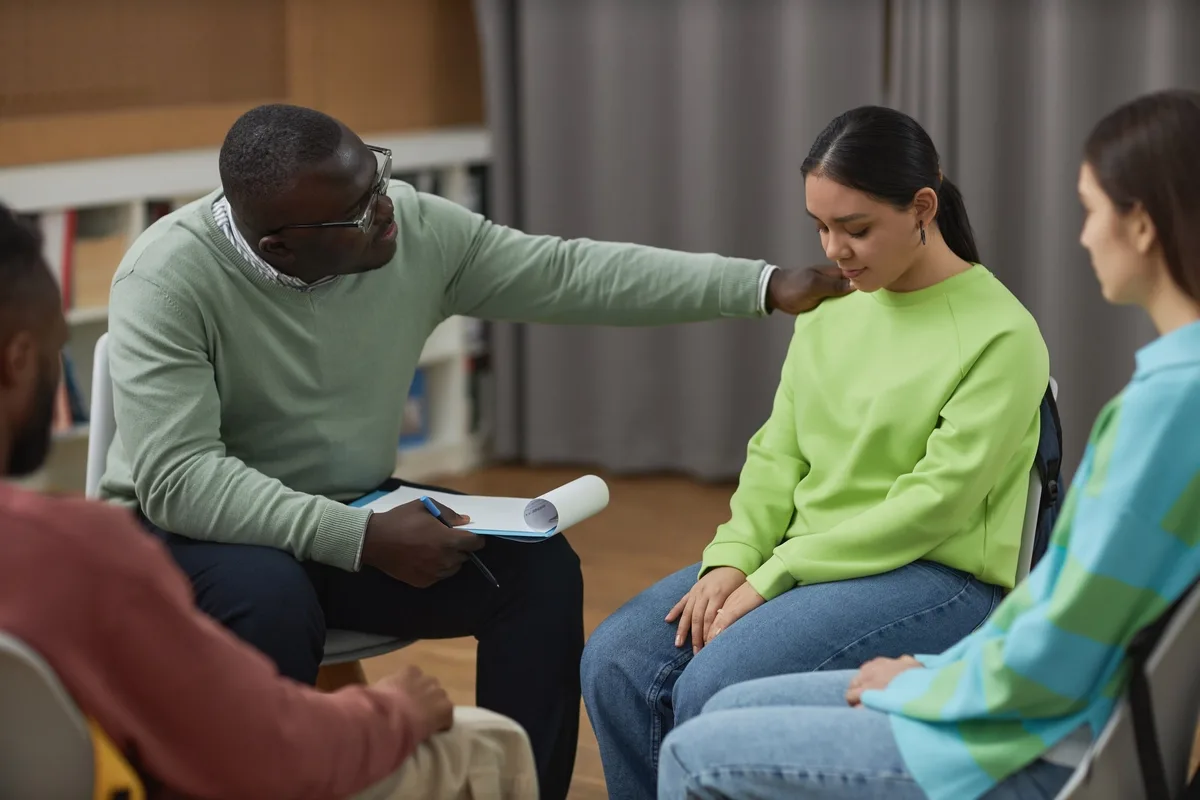
Americana Management Recovery Home
Americana Management Recovery Home is a private rehab located in Anaheim, California. Americana Mana...

Rock Solid Recovery
Rock Solid provides a men-only, safe, structured and confidential treatment environment where client...

SoberLife USA
SoberLife USA offers a medical solution to opiate and alcohol addiction. The facility takes the crav...

Asana Recovery
Asana Recovery is a private substance abuse rehabilitation facility in Costa Mesa, California. They ...

Ocean Hills Recovery
Ocean Hills Recovery offers inpatient treatment for individuals with alcohol and/or substance addict...

Capo By the Sea
Capo By the Sea is a premier rehab center located at San Juan Capistrano, California. Capo By the Se...

Social Model Recovery Systems – Touchstones
Social Model Recovery Systems - Touchstones offers outpatient services for adolescents with alcohol ...

Hope By The Sea – Via Anzar
Hope By The Sea - Via Anzar offers a wide range of programs for substance abuse and co-occurring dis...

Turning Point Sober Living Home
Turning Point Sober Living Home is a private rehab located in Mission Viejo, California. Turning Poi...

Hope By The Sea – Del Obispo
Hope by the Sea, in San Juan Capistrano, California, is a comprehensive drug and alcohol rehab for a...

Teen Savers
Teen Savers offers inpatient and outpatient treatment for adolescents with alcohol and/or substance ...

Whole Life Recovery
Whole Life Recovery offers outpatient treatment for individuals with alcohol and/or substance addict...

Safe Harbor Treatment Center for Women – Bernard Street
Safe Harbor Treatment Center for Women - Bernard Street is a private drug and alcohol addiction trea...

Sober Living Drug Rehab
Sober Living Drug Rehab is a luxury substance abuse rehabilitation facility in Costa Mesa, Californi...

Wel – Mor Psychology Group
Wel - Mor Psychology Group is a private mental health substance abuse program in Laguna Hills, Calif...

Beginnings Treatment Centers
Beginnings Treatment Centers offers outpatient services for those individuals who in recovery from s...

Pacific Shores Recovery
Pacific Shores is a private substance abuse recovery program near the scenic shores of Newport Beach...

Pace Recovery Center
PACE Recovery Center is a private mental health and substance abuse recovery center in Newport Beach...

Lead Recovery Center
LEAD Recovery Center is a private substance abuse recovery center in Orange, California, south of Gr...

California Recovery
California Recovery is a private substance abuse recovery facility in Costa Mesa, California, a shor...

Supportive Recovery Services
Supportive Recovery Services is a private substance abuse rehabilitation program in Costa Mesa, Cali...

Balboa Horizons Treatment Services
Balboa Horizons Treatment Services is a private substance abuse recovery center in Costa Mesa, Calif...

Safe Harbor Treatment Center for Women – Knox Street
Safe Harbor Treatment Center for Women - Knox Street is a private substance abuse treatment facility...

Beginnings Treatment Centers
Beginnings Treatment Centers is a private substance abuse treatment program in Costa Mesa, Californi...

Northbound Treatment Services – Behr Center
Northbound Treatment Services - Behr Center is a private substance abuse treatment center in Costa M...

Gold Coast Counseling Center
Gold Coast Counseling Center is a state accredited DUI school for those with substance abuse in Cost...

First Light Recovery
First Light Recovery offers sub-acute detox services for individuals with alcohol and/or substance a...

1st Alliance Treatment Services
1st Alliance Treatment Services is located in Westminster, Colorado. 1st Alliance Treatment Services...

Eagle Counseling Services
Eagle Counseling Services is a private rehab located in Westminster, Colorado. Eagle Counseling Serv...

Choices Westmister
Choices Westmister is a private rehab located in Westminster, Colorado. Choices Westmister specializ...

The Cornerstone Program
The Cornerstone Program is a private rehab located in Westminster, Colorado. The Cornerstone Program...

Peer Assistance Services
Peer Assistance Services is a private rehab located in Westminster, Colorado. Peer Assistance Servic...

Set Apart Treatment
Set Apart Treatment is a private rehab located in Westminster, Colorado. Set Apart Treatment special...

Counseling Center – North
Counseling Center – North is a private rehab located in Westminster, Colorado. Counseling Center – N...

Bluegrass – Estill County – Tyler Lane
Bluegrass - Estill County - Tyler Lane is located in Irvine, Kentucky. Bluegrass - Estill County - T...

Bluegrass – Estill County – Richmond Road
Bluegrass - Estill County - Richmond Road is located in Irvine, Kentucky. Bluegrass - Estill County ...

Catoctin Counseling Center – 69 East Main Street
Catoctin Counseling Center - 69 East Main Street offers outpatient treatment for individuals with al...

Alcoholism Inpatient
Alcoholism Inpatient is a private rehab located in Westminster, Maryland. Alcoholism Inpatient speci...

Re Entry Mental Health Services
Re-Entry Mental Health Services offers family, couples, group and individual therapy, the facility i...

The Weber Addiction Group
The Weber Addiction Group is a private rehab located in Westminster, Maryland. The Weber Addiction G...

Contemporary Counseling Services
Contemporary Counseling Services is a private rehab located in Westminster, Maryland. Contemporary C...

Junction
Junction is a private rehab located in Westminster, Maryland. Junction specializes in the treatment ...

Catoctin Counseling Center – 69 East Main St.
Catoctin Counseling Center - 69 East Main St. offers outpatient treatment for individuals with alcoh...

Catoctin Counseling Center – E Main St.
Catoctin Counseling Center - E Main St. offers outpatient treatment for individuals with alcohol and...

New Essecare of New Jersey
New Essecare of New Jersey is a private rehab located in Orange, NJ. New Essecare of New Jersey spec...

AA – Alcoholics Anonymous
AA – Alcoholics Anonymous is a non-profit rehab located in Orange, Texas. AA – Alcoholics Anonymous ...

Assessment Professionals
Assessment Professionals is a private rehab located in Orange, Texas. Assessment Professionals speci...

SETCADA – Right Choice
SETCADA - Right Choice is an outpatient treatment program offering services Monday thru Friday at va...

South East Texas Management Network – Mental Rehabilitation
South East Texas Management Network – Mental Rehabilitation is a public rehab located in Orange, Tex...

Spindletop Center
Spindletop Center offers outpatient and intensive outpatient services in Jefferson, Orange, Hardin, ...

Center For Discovery Cypress
Center For Discovery Cypress is a private rehab located in Cypress, Texas. Center For Discovery Cypr...


